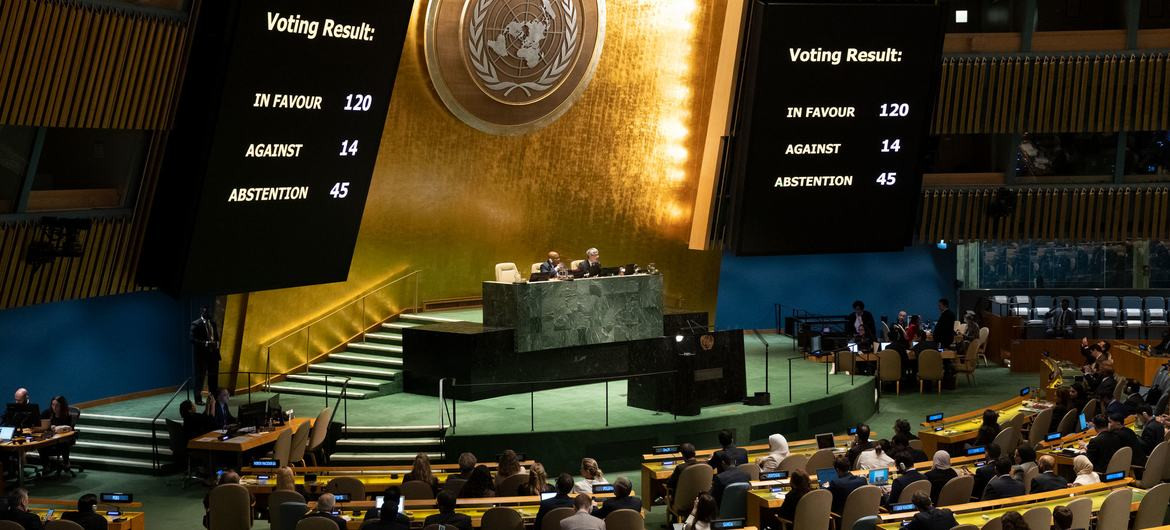Popular Reads
Top Results
Can't find what you're looking for?
View all search resultsPopular Reads
Top Results
Can't find what you're looking for?
View all search resultsThe United Nations at 80: Reform or irrelevance
The international organization stands at the cusp of reform to rid itself of outdated practices and embrace an inclusive, long-term vision to redefine its relevance in today's world, and Indonesia is well-positioned to take a lead in this transformative venture.
Change text size
Gift Premium Articles
to Anyone
I
magine an institution born from the ruins of World War II, built on noble aspirations: to maintain international peace, promote sustainable development and protect human rights. That was the vision of the United Nations, which will soon mark its 80th anniversary.
Yet in today’s complex global landscape, ranging from climate crises, natural disasters and global pandemics to protracted conflicts and humanitarian emergencies, the UN appears increasingly fatigued. Struggling to respond to modern realities, it now faces an existential question: Is the UN still relevant, or has it become a relic of bureaucracy outpaced by time?
Founded with high ideals, the UN inherited structural legacies that have become liabilities. The Security Council, for instance, remains dominated by its five permanent members, the United States, China, Russia, France and the United Kingdom, each wielding absolute veto power. This authority has often paralyzed crucial decisions, including responses to ongoing humanitarian crises in Ukraine and Gaza.
This imbalance has fueled frustration, especially among countries of the Global South, which often feel like voiceless bystanders. The UN Charter’s principle of “sovereign equality” is losing meaning. Even technical UN forums have increasingly become battlegrounds for great power rivalries, deepening mistrust.
The UN’s fragmented architecture adds to its challenges. With more than 30 entities often working in silos, frequently overlapping mandates and duplicating efforts in the same countries, its effectiveness suffers.
Internal UN reports estimate that 20-25 percent of program budgets are spent on administration. Many UN field offices remain far from crisis zones, comfortably based in the Global North, limiting their ability to respond promptly to urgent needs. As a result, waste increases and impact declines.
The UN is also facing a financial crisis. By 2025, the organization is projected to face a deficit of US$2.26 billion due to mounting arrears. In 2024, only 152 member states paid their dues in full; in 2023, just 83 percent of funding needs were met. One major donor, the United States, has cut funding to over 5,000 foreign aid projects, including 211 UN initiatives. With a regular annual budget of only $3.72 billion, dwarfed by the $2.8 trillion spent globally on military expenditures, the UN is walking a financial tightrope.
To survive, the UN must evolve. It can no longer rely on outdated approaches; bold and comprehensive reform is its only option.
Despite these challenges, hope remains. The World Health Organization, for example, has developed rapid response mechanisms following the Ebola crisis and coordinated the global distribution of 1.7 billion COVID-19 vaccine doses. More recently, the adoption of the Pact for the Future in 2024 reflects a growing collective commitment to build a more adaptive and visionary multilateral system.
UN Secretary-General António Guterres has recognized the urgency for reform. Through the UN80 initiative, he proposes restructuring the UN system around three core pillars: peace and security, development, and human rights and humanitarian affairs.
Under this plan, regional and national offices would be relocated closer to crisis zones and equipped with cutting-edge technologies, such as artificial intelligence. Agencies would be encouraged to share data systems, office space and decision-making processes to reduce duplication, streamline operations, reallocate resources and amplify impact. These changes could save billions of dollars while dramatically improving crisis response times.
The world now watches: How will the secretary-general and the UN system implement this vision? Can the UN’s specialized agencies work in a coherent, harmonized and integrated manner?
Ultimately, reform is not just a technical matter; it is political. The final decision rests with the 193 member states. The success of any transformation depends on the political courage of both developed and developing countries to rise above narrow national interests and embrace a long-term vision.
Five key steps can help guide meaningful UN reform.
First, ensure transparent and results-oriented budgeting, free from inefficiency. Second, build reform coalitions grounded in cooperation and collaboration, not unilateralism or geopolitical rivalry. Third, abandon outdated mandates, including the increasingly obsolete reliance on the veto.
Fourth, amplify the voice of the Global South, which represents 80 percent of the world’s population. Fifth, strengthen the capacity of UN country teams to be faster, more contextual and more responsive in addressing evolving crises.
The UN stands at a crossroads: Reform, or risk irrelevance.
In today’s dynamic, multipolar world, the organization must become more inclusive, impactful and in tune with present-day realities. Without reform, the UN risks becoming an empty shell, serving the interests of only a few powerful nations.
Indonesia is well positioned to lead. As a Group of 20 member, ASEAN founder and key Indo-Pacific actor, it brings strong diplomatic credentials. The country’s experience on the UN Security Council and Human Rights Council, coupled with its legacy of Asia-Africa solidarity, makes Indonesia a credible bridge builder.
Now is the time for Indonesia to take the lead, building like-minded coalitions to support the UN80 initiative and advancing a multilateral system that is fair, efficient and responsive to global challenges.
The UN must not remain a passive observer of history. It must reclaim its role as a central actor, and Indonesia can help shape the stage.
***
The writer is ambassador and chargé d’affaires ad interim of the Permanent Mission of Indonesia to the United Nations, the WTO and other international organizations in Geneva. The views expressed are personal.











